Simulation and optimization of systems vaccination with finite capacity
DOI:
https://doi.org/10.19136/hs.a21n3.4588Abstract
Objective: Characterize and optimize the flow of patients within a vaccination center, for cases where it must be consider that there is a finite capacity in the queues in front of the stations.
Materials and Methods: Vaccination systems are assumed to behave as a closed queue network with finite capacity; To characterize the flow of patients, simulation and a Box-Bhenken experimental design are applied, where the variables are the capacities in the queues (buffer); Subsequently, the metamodels of the cycle time and the number of vaccinated patients are obtained. Finally, the optimal allocation of places in the queues is calculated by applying mathematical programming.
Results: The queues for filling out forms, delivery of information and vaccination are the ones with the greatest effect on the length of stay; the vaccination and triage queues have the greatest effect on the number of vaccinated patients. If the output of patients is maximized, the greatest number of places should be assigned to the vaccination station and the rest of the spaces are distributed in the other stations; On the other hand, if the length of stay is minimized, then most of the places are assigned to the Triage station and then to the Vaccination station, the rest of the spaces will be assigned depending on the total capacity of the system.
Conclusions: Those responsible for managing this class of systems must define the criteria under which they must quantify the performance of the vaccination system and, based on this, manage and control the process. When demand exceeds expectations and increasing capacity is not feasible, then the alternative is to optimize flow by controlling the number of people within the system.
Downloads
Published
Issue
Section
License
Copyright (c) 2022 Horizonte Sanitario

This work is licensed under a Creative Commons Attribution-NonCommercial-ShareAlike 4.0 International License.





























